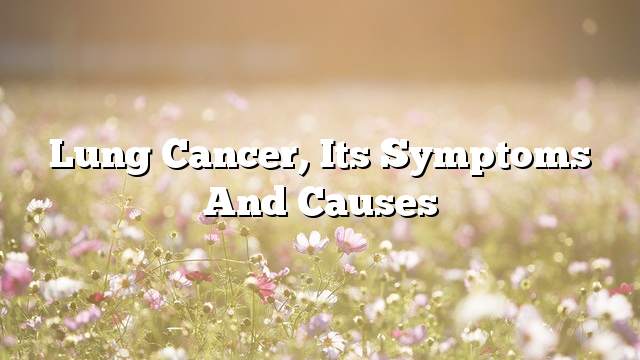Is the growth of some of the cells of the layer of the trachea of the trachea faster than normal and irregularly, leading to accumulation and the occurrence of retrograde mucus and develops some in the process of removing mucus. Some cells multiply rapidly and become malignant. These cells clump and destroy normal cells and lead to mucus retention in the lungs. Cancer cells form a mass of tumors blocking the trachea.
Lung cancer is the second most common cancer in the world and is particularly prevalent in men, especially smokers, with about 95% of lung cancer sufferers.
Causes of Lung Cancer:
- Smoking: The risk of infection increases with the number of cigarettes a person smokes daily.
- Environmental pollution: Studies show that the number of injuries is highest in cities and villages.
- The nature of the person’s profession: where exposure to different radiation causes cancer.
- Radon gas: A gas produced by the fission of uranium, which is found mainly in some industries.
The symptoms of lung cancer are numerous and the most important are:
- Cough: It is the first symptom and often coincides with the presence of inflammation in the bronchus and causes the secretion of sputum.
- Exits blood with coughing.
- Pain in the chest.
- Rare pain due to the effect of the tumor mass on the adjacent organs.
- Difficulty in removing sputum from the trachea.
- The face is pale to a color that is slanted to green.
Cancer is divided into two parts:
- Small cell cancer.
- Non – small cell cancer.
Diagnosis of lung cancer: After taking the complete pathology and conducting clinical and laboratory tests and the operation of axial and cutaneous images of the chest and the patient is undergoing a process of endoscopy of the airway for the detection and sampling required
Methods of Treatment : First of all prevention of causation is one of the priorities required
The treatment of the tumor and the eradication of the tumor in its early stages depends on the nature of the concentration of the disease and the general condition of the disease
Chemotherapy.
Therapeutic radiotherapy.
Treatment of some drugs that control the formation of carcinogenic cells.
